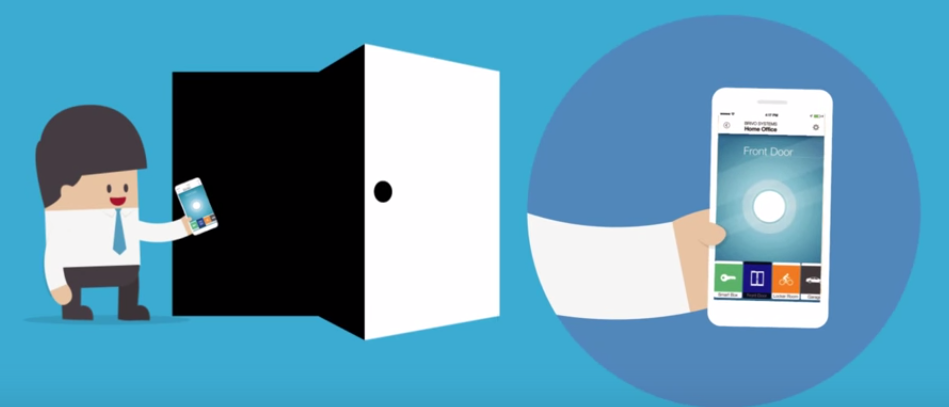 NEWS
NEWS
 NEWS
NEWS
 NEWS
NEWS
One company looks to revolutionize the access keycard, delivering new Internet of Things (IoT) solutions to the budget-conscious enterprise.
Most buildings these days use keycards that can be tapped or swiped on an access port to allow a person to enter a room or building. This lets building managers know who accessed the room or how many people entered the building, but the problem with access keycards is that they can be damaged, misplaced or lost, which means the card would need to be replaced. For security-minded companies, this means additional and unnecessary expense.
Brivo, Inc., a company that provides building security by means of cloud-based access control and video surveillance, released the Brivo Mobile Pass app.
The Brivo Mobile Pass is an enhancement to the Brivo OnAir access control system, which means customers who have the system installed will not need any additional hardware and can also provide mobile passes to their own clients immediately.
“We are giving all of our customers five free Brivo Mobile Passes so that they can use it immediately,” said Steve Van Till, CEO of Brivo. “Mobile credentials are changing the way access control works. It’s not just about convenience and improved security—although that’s a huge part of it. It’s that we are improving the relationship with the people who come and go from the spaces we protect.“
Think of it like a smart door lock, quite like the August Smart Lock for consumer smart homes. It allows people to lock and unlock doors using their smartphone, and give temporary virtual keys to other people so they can unlock the door using their own smartphone. The Brivo Mobile Pass app works in a similar manner, but clients of Brivio, as well as unaffiliated Brivo-equipped facilities such as gyms, parking garages, and offices, don’t have to install any new hardware as the new feature comes as an update to the system.
This mobile app makes it easier for users to enter premises and not worry about forgetting their keycard, so long as they don’t forget their smartphone. To gain access, users would just need to launch the Brivo Mobile Pass app on their smartphone and it will communicate with the cloud and request the door to be opened. Users can add Brivo Mobile Passes from an unlimited number of Brivo OnAir accounts via email.
As for the security of the system, Van Till stated that the company invested a lot in the encryption and cyber security of the service.
“When designing it, we recognized that cloud-based authentication is a very well understood field, with rich solutions that work very well for banking, electronic signatures, and the like. We chose to adopt these proven secure approaches over the much less developed technologies that are utilizing Bluetooth door readers,” Van Till explained.
The system will also rely on the user using passcodes or biometric security to keep the app secured on their smartphone.
The Brivo Mobile pass app is available for download on iOS and Android, and will be available in an OnAir version 11.1, to be released Friday, September 25.
This is Brivo’s first major announcement since the company was acquired by serial entrepreneur and president and CEO of Eagle Eye Networks Dean Drako back in June.
Brivo isn’t the only company attempting to revolutionize building security entry. Bioelectronix, Inc. offers biometric access control systems that utilize fingerprints to grant entry, and some of their terminals have a biometric card reader and PIN combo for added security. The downside to this offering is that it has user limits ranging from 500 to 1000 users, depending on the model.
FaceKey Corp. is another company that banks on the uniqueness of one’s fingerprint for security and offers three-factor identification, an anti-pass back (to keep people from sharing their passes), exit requests and other security measures to deter unauthorized entry and fraud. Unlike Bioelectronix, FaceKey does not incorporate the use of keycards as the company deems them completely unsecure.
To differentiate itself in this growing market, Brivo generates unique one-time codes for each device, which means no two smartphones will ever use the same code to gain access to a room or building.
Support our mission to keep content open and free by engaging with theCUBE community. Join theCUBE’s Alumni Trust Network, where technology leaders connect, share intelligence and create opportunities.
Founded by tech visionaries John Furrier and Dave Vellante, SiliconANGLE Media has built a dynamic ecosystem of industry-leading digital media brands that reach 15+ million elite tech professionals. Our new proprietary theCUBE AI Video Cloud is breaking ground in audience interaction, leveraging theCUBEai.com neural network to help technology companies make data-driven decisions and stay at the forefront of industry conversations.